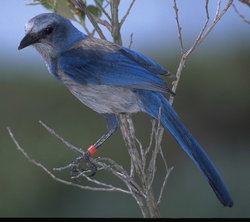Florida Scrub Jay
|
|
| Florida Scrub Jay Conservation status: Vulnerable | ||||||||||||||
|---|---|---|---|---|---|---|---|---|---|---|---|---|---|---|
 Florida Scrub Jay | ||||||||||||||
| Scientific classification | ||||||||||||||
| ||||||||||||||
| Binomial name | ||||||||||||||
| Aphelocoma coerulescens (Bosc, 1795) |
The Florida Scrub Jay is one of four species of scrub jay (Aphelocoma) native to North America. It has little fear of humans. Its range is endemic to the U.S. state of Florida.
| Contents |
Characteristics
Weight - 2.5 to 3 ounces
Length - 12 inches
Physical features - Lacks crest, strong black bill, blue head and nape, whitish forehead and supercilium, blue bib, blue wings, grayish underparts, gray back, long blue tail, black legs and feet.
Behavior
An inquistive and intelligent bird, the Florida Scrub Jay is only species of bird localized entirely within the state of Florida. Because of this, it is heavily sought by birders who travel from across the country to observe this unique species.
The most striking attribute of the Florida Scrub Jay's behavior is its remarkable tameness. Scrub Jays show almost no fear of people and will even take peanuts from people's hands and lips. On occassion, Scrub Jays will also steal silverware and other shiny objects in a similar manner of its cousin the American Crow.
Scrub Jays are also one of the few cooperative breeding birds in North America. Fledgling Scrub Jays remain in their parents habitat for several years and help to rear young, watch for predators, and defend territory against neighboring Jay family groups. These families can range in size from 2 to 8.
After about 2 to 3 years, fledglings leave the group to form mating pairs of their own. Mating season ranges from March to June. Clutches usually contain about 3 to 4 eggs which are incubated in about 18 days. Fledgling occurs in about 16 to 19 days.
Song
Relatively quiet for a Jay, the Florida Scrub Jay is usually seen before it is heard. Calls vary, but a throaty quay, quay, quay is common. Females make a distinctive "hiccup" call.
Diet
Florida Scrub Jays are omnivorous, and eat a wide variety of acorns, seeds, peanuts, insects, tree frogs, turtles, snakes, lizards, bird eggs, nestlings, and young mice.
Scrub Jays routinely cache thousands of acorns a year, burying them just beneath the surface of the sand. They are typically buried in the fall and consumed during the winter and spring. Those acorns not found germinate, making the Florida Scrub Jay a premier disperser for a variety of oak trees.
Habitat
The Florida Scrub Jay is found only in Florida scrub habitat, an ecosystem found only in central Florida. It is characterized by nutrient-poor soil, occassional drought and frequent wildfires. Because of this somewhat harsh weather pattern, it is host to a small assortment of very specific plants, including sand pines, sand live oak, myrtle oak, Chapman's oak, scrub oak, and various other hardy plants such as cacti.
Scrub habitat has dwindled considerably in the past several decades as Florida has continued to develop. Fire suppression also leads to the natural sucession of large oaks and trees which changes the habitat. In recent years, environmental groups within the state have made a strong effort at preserving Florida's remaining scrub through controlled burns and even clearing out areas of large trees to increase the size of a scrub habitat.
Conservation
The Florida Scrub Jay was officially listed as a threatened state species by Florida Game and Fresh Water Fish Commission in 1975 and it was listed as a threatened federal species by the U.S. Fish and Wildlife Service in 1987.
In 1993, there were estimated to be 4,000 breeding pairs left in the wild. Despite the protections, the Scrub Jay is still thought to be on the decline. Studies done in Brevard County, once the most numerous Florida county for Scrub Jays, noted declines of about 33% since the 1993 census alone.
In recent years there has been some debate about whether or not the Florida Scrub Jay should be officially listed as an Endangered Species. However, environmentalists hope that current conservation efforts should help the species population to at least stabilize.
References
Brevard County Natural Resources Management Office (2005). Florida Scrub Jay (http://www.brevardcounty.us/environmental_management/wildlife_scrub_jay.cfm). Retrieved Apr. 12, 2005.
http://www.mbr-pwrc.usgs.gov/id/framlst/infocenter.html
Alsop, Fred; Alsop III, Fred (2004).Smithsonian Handbooks: Birds of Florida(1st Edition). Portland: Book News, Inc.
